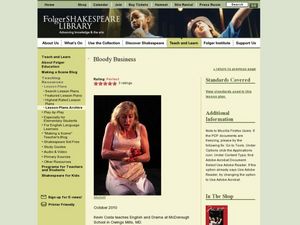Curated OER
Can You Hear Macbeth Now?
Students explore how sound affects scene understanding using the Shakespeare play Macbeth. In this audio and play analysis instructional activity, students respond to Macbeth events as if they were at a sporting event. Students listen to...
Curated OER
The Macbeth Tango
Students examine how Macbeth and Lady Macbeth relate to each other in individual scenes and throughout the play. By taking elements of that relationship and making them physical, students analyze the Macbeths' marriage on many different...
Curated OER
Macbeth Madness
Students analyze Shakespeare's Macbeth through the reading and discussion activities. In this Macbeth lesson, students read Act IV and V and then discuss the ending to the play.
Curated OER
Macbeth Madness
Students analyze Shakespeare's Macbeth in a variety of creative activities. In this Macbeth lesson, students read Act Two, Scene IV and Act Three, Scene I-VI. Students then complete the text given at the link.
Curated OER
Macbeth Madness
Students participate in various social studies activities in correlation to William Shakespeare's Macbeth. In this Macbeth lesson, students study maps of Scotland, England, and Norway to identify locations mentioned in Macbeth. Students...
Curated OER
Macbeth and Lady Macbeth's Tortured Sonnet
Students read four of Shakespeare's sonnets and determine whether they are read from Macbeth's or Lady Macbeth's point of view. They support their decision using evidence from the text.
Curated OER
The 32-Second Macbeth
Pupils read a very short script synopsis of Macbeth. They read the script, in small groups, trying to break the 32-second record, then write their own 32-second versions of one act from Macbeth.
Curated OER
Macbeth Madness
Students research Macbeth online and complete computer and graphing activities for the play. In this Macbeth activities lesson, students research Macbeth and bookmark the URL's. Students complete activities for the topic on spreadsheets...
Curated OER
When Fair is Foul: Paradox and Equivocation in Macbeth
Pupils read Macbeth for examples of paradox and equivocation in the text. In this literature-response lesson plan, students work in groups to analyze Shakespeare's writing for use of paradox using handouts to guide their search. Student...
Curated OER
Macbeth: What's Up with the Crime Scene?
High schoolers are introduced to Macbeth by having them act out the scene where Duncan's murder is discovered. This activity enable students to use dialogue only to discover the structure and format of a scene and explain plot.
Curated OER
Macbeth
Students examine patterns of imagery in Macbeth by using online resources. Students compare the patterns they see to those they've found in other Shakespeare plays. Then students draw conclusions about why Shakespeare might have used the...
Curated OER
Screwing Courage in Macbeth
High schoolers read, analyze, and act out the scenes 1.7.29-79 of the William Shakespeare play, "Macbeth." They discuss motivation, tactics, and obstacles, and improvise scenes suggested by the class.
Curated OER
Literary Response and Analysis
Students analyze the archetype of 'the fall' in Shakespeare's Macbeth. In this literary analysis lesson, students work in tiered learning groups to analyze the characters of Macbeth and Lady Macbeth. Students use the book of Genesis as...
Curated OER
The Portrayal of the Witches
Eleventh graders discover the importance of the fortune teller in Shakespeare's Macbeth. After watching two interpretations of the play, they examine and compare the portrayal of the character. They create their own modern adaptation of...
Curated OER
So Foul and Fair a Play
Students watch various interpretations of Shakespeare's Macbeth in film. In groups, they examine the setting, characters, music and sequence. They compare and contrast the various films and discuss the differences. They write an essay on...
Curated OER
Stomping and Romping with Shakespeare
Did you know that Green Eggs and Ham is written in iambic pentameter? Model the rhythm of language using Dr. Seuss’s tale. Direct class members to march about the room tapping their right foot on the first syllable and stomping their...
Curated OER
Acting in Marriage-Is It on Stage or Off?
Learners compare views of marriage in Macbeth and Cat on a Hot Tin Roof. In this comparative literature instructional activity, students discuss and debate the marriages of Macbeth and Lady Macbeth in Shakespeare's Macbeth Brick and...
Curated OER
Hark! The Sounds of Murder
Young scholars analyze the Macbeth murder scene through textual analysis and construct the murder scene of Duncan through the use of sound only. In this Macbeth lesson, students work in groups to analyze the murder scene of Duncan from...
Curated OER
Anon Methought the Umbrellas Began to Move
Young scholars reenact a scene from Macbeth using umbrellas as props.
Curated OER
Macbeth Madness
Students analyze Shakespeare's Macbeth. In this Macbeth lesson plan, students read Act Two Scene iv and Act Three Scenes i-vi in the play and complete the test from the given link.
Curated OER
Double, Double, Toil and Trouble: A Dual Exploration of Macbeth
High schoolers emulate a key practice of Renaissance theater: doubling. The goal of this lesson is for students to experience-to see, hear, and feel-the differences between characters. Each group presents scenes to the rest of the class.
Curated OER
MACBETH and the Themes of Ambition,
Students describe and compare characters and situations in dramas from and about cultures and historical periods, illustrate in improvised or scripted scenes, and discuss how theater reflects a culture.
Literacy Design Collaborative
Whom Do We Trust, and Why?
Is it possible to regain trust? Scholars put much thought into the subject of trust after reading Shakespeare's Macbeth. Readers work together to analyze how the character relationships develop the a message about trust. They then create...
Curated OER
Bloody Business
Students research word frequencies in Macbeth and create a frozen picture inspired by a word. In this Macbeth lesson, students view Blood Will Have Blood and discuss the dual meaning of the word "blood." Students identify five major...

























